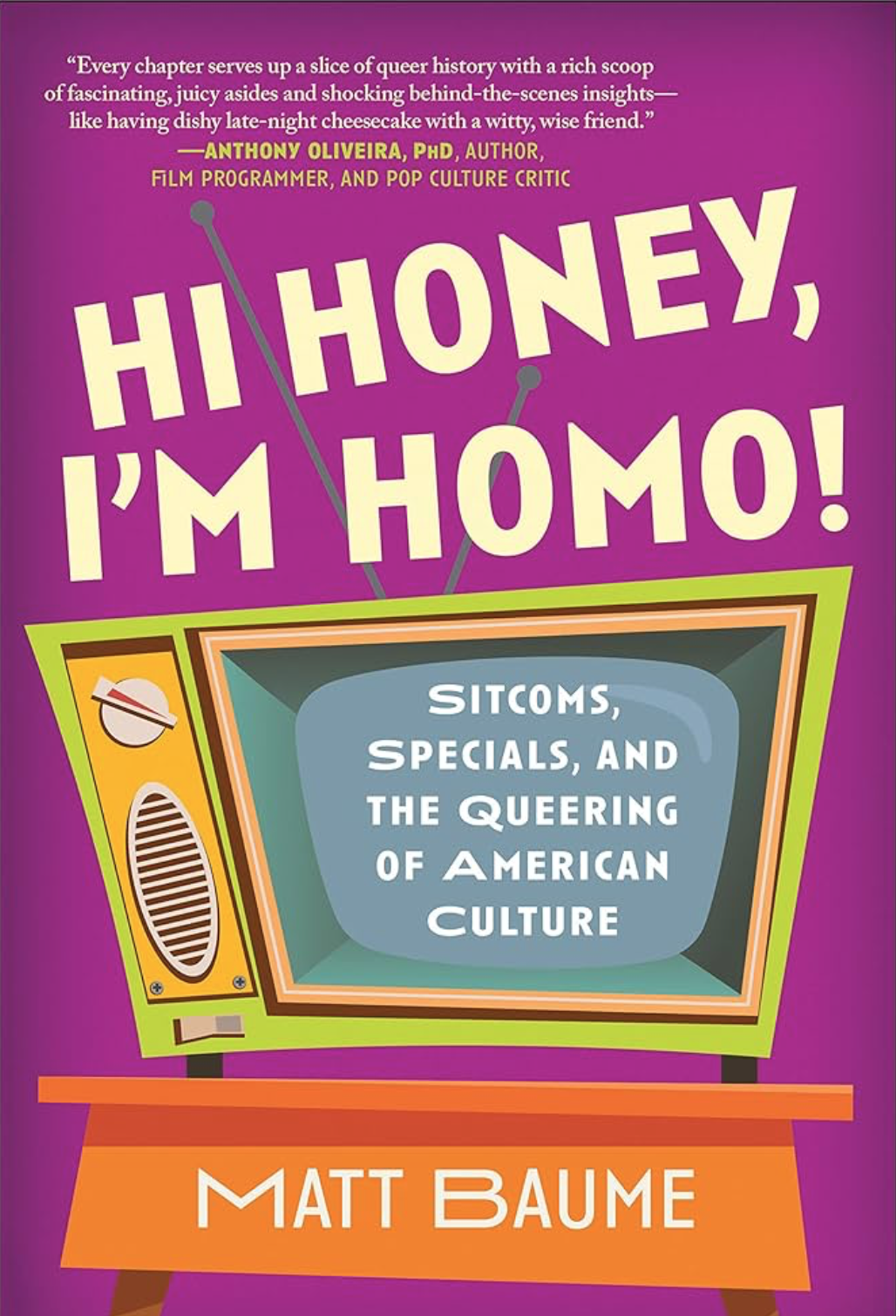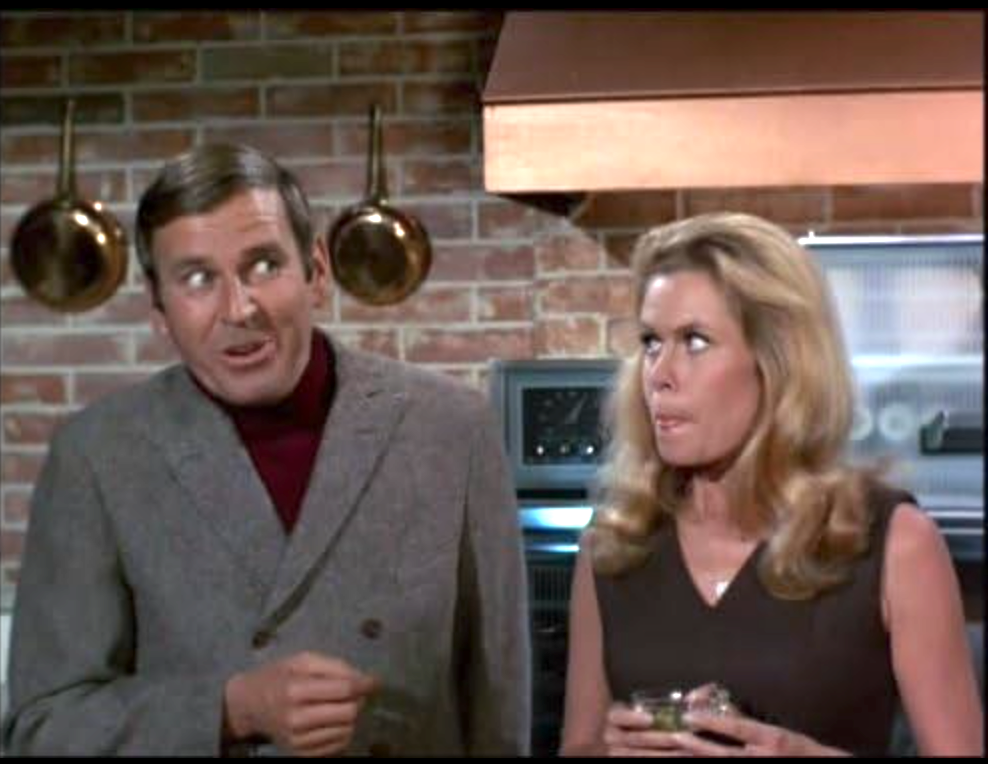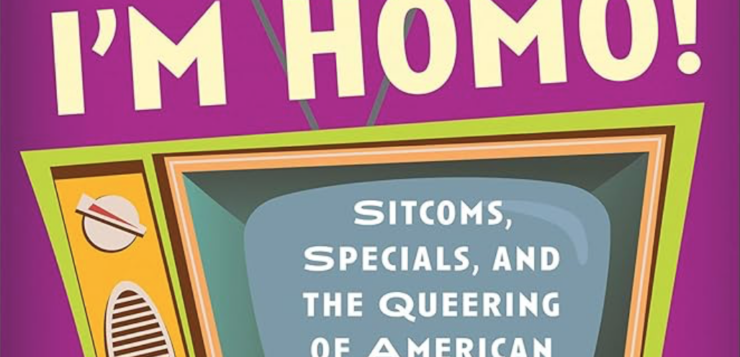 HI HONEY, I’M HOMO!
HI HONEY, I’M HOMO!
Sitcoms, Specials, and the Queering of American Culture
by Matt Baume
Smart Pop Books. 288 pages, $22.
MATT BAUME is a Seattle-based podcaster and YouTuber who’s the author of a new book with the clever title Hi Honey, I’m Homo! He explores the role that TV sitcoms have played in the advancement of LGBT rights through their ability to project queer lives into American living rooms and psyches. He covers the period from the mid-1960s, with Bewitched, through Modern Family in the 2010s, showing how attitudes changed along with increasing LGBT visibility on TV. He credits TV with helping to move the cultural needle from vilification and erasure through caricature and tokenism to mild acceptance and even celebration today.
Baume reminds us that in the era of Bewitched, “Television programs frequently resorted to disparaging tropes: pansy perverts, insane transvestites, criminal dykes. Whether Americans tuned in to watch sitcoms, dramas, or the nightly news, TV reflected the prevailing belief that queer people were, at best, mincing freaks and, at worst, a public menace.” It wasn’t until the 1970s, spurred by the growing Gay Liberation movement, that community organizers began to pressure the three major networks to stop airing cruel stereotypes and start taking a more realistic approach.
Baume is aware that progress in TV representations may just have been mirroring changes in the larger society. He focuses on the role of sitcoms because he believes they can present social change in a way that’s less confrontational and threatening than other genres. Also, comedy allows people to let down their guard as they’re introduced to unfamiliar, even unwelcome, ideas. Because you see these characters on a weekly basis, they become like friends, and you’re more likely to accept their quirks or nonconforming behaviors.

Baume’s book is divided into twelve chapters, each focusing on one sitcom, with chapters on Soap, Cheers, Friends, The Golden Girls, and Will & Grace, among others. They’re presented in chronological order, which allows him to trace the evolution of LGBT characters over time. Each chapter also includes a rundown of historical events, especially protests and demonstrations, that were taking place during the run of a given series.
The premise of Bewitched (1964-1972), of course, was that Samantha, a witch, was married to a mortal advertising exec named Darrin, who insists that Samantha’s status as a witch be kept a deep, dark secret, all in the interest of living a normal life in the suburbs. The whole idea of hiding a secret identity is queer in itself, with witches as a metaphor for any group that has to hide its identity. In one episode, a number of witches are seen protesting with signs saying “Witches are people too,” mirroring the early pre-Stonewall gay protests.
Also ahead of its time was All in the Family (1971-1979). In the “Judging Books by Covers” episode, Archie Bunker, after thinking incorrectly that one of daughter Gloria and husband Mike’s friends was gay because he wore an ascot, comes to realize that his macho, beer-drinking, ex-football-playing buddy is gay. Archie’s face “passes through several distinct emotions in the space of a few moments from confusion and horror.” The final season had an episode about a lesbian school teacher who could lose her job if she comes out, despite being kind and capable. This episode was rebroadcast the day before the vote on California’s 1978 Briggs Amendment, which would have blocked queer people from holding jobs in schools. It was defeated, and some people thought this episode might have played a role.
Soap (1977-1981), a parody of TV soap operas, featured a gay character named Jodie, played by Billy Crystal. At first Jodie was confusing, because the writers were mixing up sexual orientation and gender identity, with Jodie at times a gay man, at other times closer to transgender. Crystal met with the writers and asked that the character be more consistent and deep. Eventually Jodie comes out, co-parents as a gay man, wins a custody battle, and is proud of who he’s become.
Will and Grace (1998-2006) was probably the series that had the greatest impact on U.S. society, later endorsed by no less than Vice President Joe Biden, who opined: “I think Will & Grace probably did more to educate the American public than almost anything anybody has done so far.” W&G had fairly low ratings until the episode in which, furious that their favorite show censored a same-sex kiss, Will and Jack storm into the NBC offices to complain. Executives brush them off saying: “You’ll never see two gay men kissing on network TV.” But on their way out of the building, they wind up in a crowd outside a taping of The Today Show. Will waits until a camera is close, grabs Jack, and plants an exaggerated kiss on his face, making it the first male same-sex kiss in TV history.
Baume sees Modern Family (2009-2020), which featured the wedding of Jay and Cam, as the culmination of years of progress in gay visibility and the fight for equal rights. As the show’s ho-hum title suggests, a gay couple is just part of today’s modern family. A sea change in attitudes going back to the 1970s allowed the series to flourish and become a critical hit and a ratings juggernaut.
Hi Honey, I’m Homo offers a fast-paced sweep across LGBT representations over time. They’re important because the media play such an important role in defining what’s normative and what’s cool. “Television isn’t just a piece of furniture to watch,” writes Baume, “it’s a conversation, a tool, a weapon, a war, a party, an instrument, and an opportunity. It’s a project to participate in rather than passively watching in the dark.” LGBT people are no longer invisible on TV, but calls to participate proactively rather than remain complacent are as urgent now as they were in the 1960s and ’70s, as the forces of resistance and intolerance have never gone away.
Brian Bromberger is a freelance writer who works as a staff reporter and arts critic for The Bay Area Reporter.





